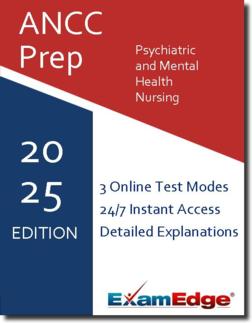ANCC Psychiatric and Mental Health Nursing (RN) Practice Tests & Test Prep by Exam Edge - Topics
Based on 25 Reviews
- Real Exam Simulation: Timed questions and matching content build comfort for your ANCC Psychiatric and Mental Health Nursing test day.
- Instant, 24/7 Access: Web-based ANCC Psychiatric and Mental Health Nursing practice exams with no software needed.
- Clear Explanations: Step-by-step answers and explanations for your ANCC exam to strengthen understanding.
- Boosted Confidence: Reduces anxiety and improves test-taking skills to ace your ANCC Psychiatric and Mental Health Nursing (PSYRN).

Understanding the exact breakdown of the ANCC Psychiatric and Mental Health Nursing test will help you know what to expect and how to most effectively prepare. The ANCC Psychiatric and Mental Health Nursing has 125 multiple-choice questions The exam will be broken down into the sections below:
| ANCC Psychiatric and Mental Health Nursing Exam Blueprint | ||
|---|---|---|
| Domain Name | % | Number of Questions |
| Assessment and Diagnosis | 22% | 27 |
| Planning | 22% | 27 |
| Implementation | 39% | 48 |
| Evaluation | 18% | 22 |


